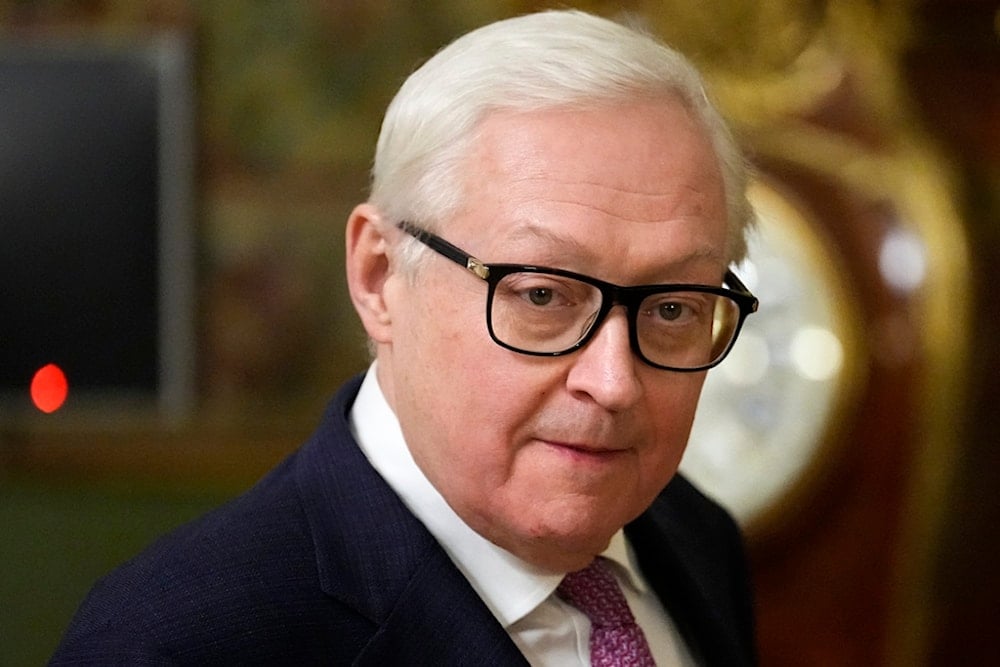Russia skeptical about US relations improving under Trump: Deputy FM
"The liberal-globalist agenda has been replaced by the reality of national populism," Deputy Foreign Minister Ryabkov said, adding, "US expansionism is still alive and well, as well as their drive to dominate global affairs. It's just being framed differently compared to how the Democrats did it."
-

Russian Deputy Foreign Minister Sergei Ryabkov arrives to attend the talks between Russian Foreign Minister Sergey Lavrov and Colombian Foreign Minister Luis Gilberto Murillo, in Moscow, Russia, Thursday, November 14, 2024. (AP)
The Russian government does not anticipate a significant improvement in US-Russia relations following Donald Trump's return to the White House, according to Deputy Foreign Minister Sergey Ryabkov. Speaking at a press conference on Monday, Ryabkov expressed skepticism about any major shift in Washington's stance toward Moscow.
Addressing diplomatic ties, Ryabkov stated that Moscow has little optimism regarding any breakthrough in relations. "We're not too optimistic about this area improving, compared to others," he said.
He added that Russia remains officially labeled as a 'major adversary' within both US domestic politics and foreign policy. "This perception has long been reinforced by a bipartisan consensus in the United States," he added, highlighting that Washington's strategic approach toward Moscow has remained largely unchanged, regardless of political leadership.
Escalating tensions over Ukraine
One of Russia's primary concerns remains US military support for Ukraine, which Ryabkov labeled as multi-faceted and deeply concerning for Moscow.
"State-of-the-art weapons that are supplied by Washington to the Kiev regime, including long-range missile systems serviced by specialists from the Pentagon and which are guided to their targets by US intelligence services," he noted, reinforcing Russia's stance that Western military aid prolongs the conflict and directly threatens Russian security.
Recent reports confirm that the US has now authorized Ukraine to use long-range missile systems to strike inside Russian territory, marking a significant policy shift. Previously, such strikes were discouraged to avoid escalating tensions with Moscow. The decision includes the use of Army Tactical Missile Systems (ATACMS), which are capable of targeting key Russian military sites.
Read more: Russia convinced ATACMS attack organized by NATO: Envoy to Al Mayadeen
Meanwhile, Russian forces have made significant territorial gains in Ukraine, capturing over 90 square miles in just one week, the fastest advance since the initial invasion. Fighting has intensified in regions like Donetsk and Zaporozhye, with Ukrainian forces facing growing challenges due to limited resources and internal instability.
Nuclear arms control at risk
Beyond the battlefield, US-Russia tensions extend to nuclear arms control. Ryabkov raised concerns over the future of the New START treaty, the last remaining nuclear arms control agreement between Moscow and Washington, which is set to expire on February 5, 2026.
He stated that prospects for extending or renegotiating the treaty appear dim, as current diplomatic talks have stalled. Washington has pushed for a trilateral discussion involving China, while Moscow has advocated for a five-nation format including the UK and France. The uncertainty surrounding the treaty has fueled concerns over a potential arms race, particularly as global tensions rise.
Trump's foreign policy: A shift in rhetoric, not strategy
While Ryabkov acknowledged that Trump's presidency marks a shift in US political rhetoric, he argued that core expansionist policies remain unchanged.
"The liberal-globalist agenda has been replaced by the reality of national populism," he explained. "That said, US expansionism is still alive and well, as well as their drive to dominate global affairs. It's just being framed differently compared to how the Democrats did it."
Read more: Zelensky calls on allies to invest in Ukraine rare earth elements
Trump officially assumed office on January 22, becoming the 47th president of the United States. He and Vice President James David Vance took their oaths inside the Capitol Rotunda, a rare move, as this was the first time in 40 years that an inauguration was not held outside the Congress building.

 4 Min Read
4 Min Read










